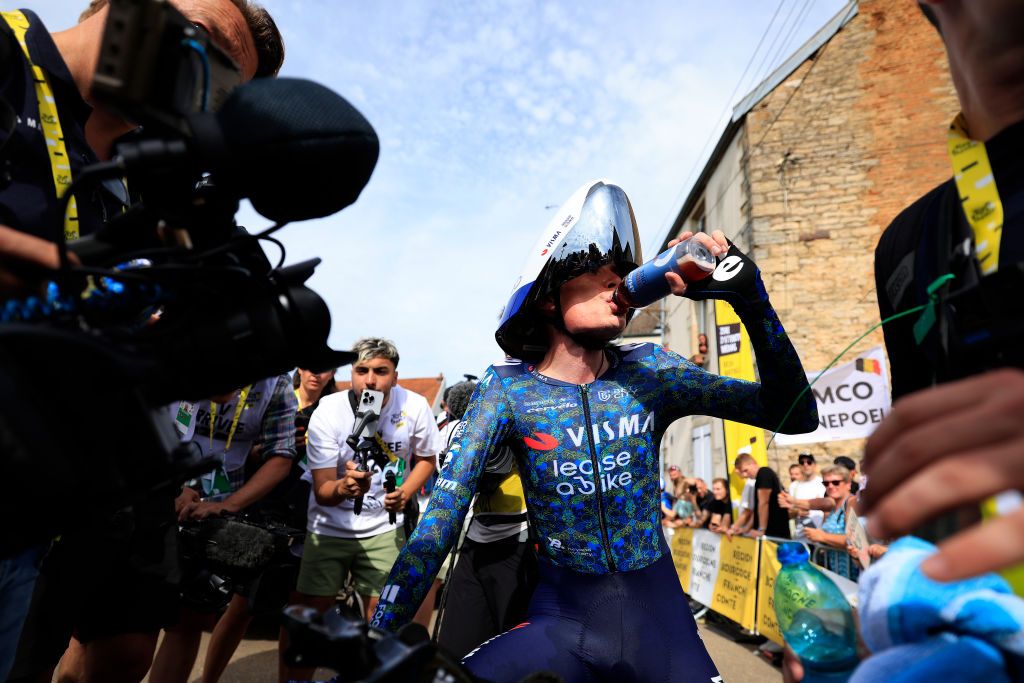On Friday, the Tour de France’s stage 7 time trial drew to a close in the race’s first week. In the process, the stage further clarified a GC picture that many had expected before the race’s great Tuscan jaunt kicked off three weeks of action en route to Nice.
The 25.3km test against the clock, run against the backdrop of the vineyards of Burgundy, brought starring roles for the ‘big four’ Tour de France contenders – yellow jersey Tadej Pogačar, world time trial champion Remco Evenepoel, defending champion Jonas Vingegaard, and 2020 runner-up Primož Roglič.
Evenepoel may have triumphed on stage 7, in line with most predictions ahead of the half-hour blast south of Dijon, but the order at the top of the overall standings is as listed above, as it was on Thursday night.
Vingegaard, winner of the past two Tour de France editions and a man who has beaten Pogačar in the two most recent time trials at the race, may have shed more time – 22 seconds – to his great rival of recent summers. Still, he insisted later that he was more than happy with his ride.
“To be honest, I think it was a good time trial for me,” Vingegaard said. “I’m happy with my performance and to only lose 37 seconds to Remco on a time trial that suits him really well is pretty good for me.”
The Dane has spent much of his season battling back from a laundry list of injuries suffered at a mass crash at Itzulia Basque Country in April, and his form, and ability to dive back into racing immediately at this high level, was in some doubt leading into the Tour.
Indeed, before the race started in Florence, he said “Everything from here is a bonus”, having made it to the start line.
The latest race content, interviews, features, reviews and expert buying guides, direct to your inbox!
Now, he’s riding high and, barring a 50-second time loss to Pogačar on stage 4’s high-mountain meet atop the Col du Galibier, everything is going to plan.
“I wouldn’t say it’s a big hit but rather the opposite – that I expected to lose more time,” Vingegaard said of stage 7, “It’s a time trial that’s way more favourable for [Pogačar]. It’s good to lose only 25 seconds to him today. Last year I took seven-and-a-half minutes in two stages, so the power is there, and we just have to believe in our plan.”
Vingegaard had passed through the stages’ three intermediate checkpoints – at the base of the mid-stage hill, at the peak, and following the descent – in third place, reaching the third after 19.5km with a 22-second deficit to Pogačar, and a further three to Evenepoel.
He was up on Roglič by four seconds, though a slight fade on the flat, straight final run to the line saw him shed more time. He closed out his ride 37 seconds behind the winner, 25 down on Pogačar, and four down on Roglič.
“I felt good on the climb,” Vingegaard said. “Especially in the first part of the time trial, I felt really good. I died a little bit before the end but I think I had some good power so I can be happy with that.
“As I said before the start, everything is a bonus. Of course, I have ambitions and I want to do well. But whatever happens, happens and I cannot change it.”
Despite the time loss on the day, which, if recent Tours are anything to go by, will likely be minor in the grand scheme of things, Vingegaard said that the day wasn’t the one that caused him most worry before starting the race. Neither was the Galibier day, he said.
“I think San Luca was probably the day I worried the most about. There, I didn’t lose time.
“Today I lost only 25 seconds on a course that suits Remco and Tadej way more than it suits me. So, to only lose that it’s a good day for me today.”
One final question posed to Vingegaard probed how he has felt about his performances as the race has progressed.
Is it increasing as the stages pass and he gets fully into the swing of racing after such a long layoff? His answer was short and unequivocal.
“Yes.”
Get unlimited access to all of our coverage of the Tour de France – including breaking news and analysis reported by our journalists on the ground from every stage of the race as it happens and more. Find out more.

